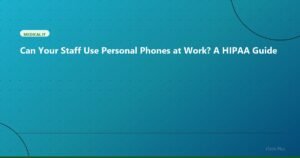Best Practices and Recommended Actions
Ransomware is a growing threat for businesses of all sizes, as it can result in the loss of important data and disruption of operations. The impact of a ransomware attack can be severe, and businesses may be forced to pay a large sum of money to regain access to their own data. In this post, we will discuss the best practices for staying protected from ransomware attacks and the recommended actions to take if your business is attacked.
Best Practices for Staying Protected:
- Keep software up-to-date: Regularly update your operating system, applications, and security software to stay protected against known vulnerabilities.
- Use a firewall: A firewall can help block unauthorized access to your network and can help prevent malware from spreading.
- Use endpoint protection: Use endpoint protection software to detect and block malware on individual computers and devices.
- Back up your data: Regularly back up your data to an external or cloud-based storage location. This will allow you to restore your files in the event of a ransomware attack.
- Train your employees: Educate your employees about the dangers of ransomware and how to avoid it, such as not clicking on links or attachments in suspicious emails.
- Use cloud-based email filtering: Use a cloud-based email filtering service to detect and block malicious emails and attachments.
- Use multi-factor authentication: Use multi-factor authentication (MFA) to protect your accounts from unauthorized access.
- Have a incident response plan: Have a incident response plan in place, for example, a detailed incident response plan that outlines the steps to take in the event of a ransomware attack, including who to contact and what to do in the event of an attack.
Recommended Actions if Your Business is Attacked:
- Isolate the affected systems: Disconnect the affected systems from the network to prevent the malware from spreading.
- Identify the ransomware: Identify the type of ransomware that has infected your systems, as this can inform your response.
- Do not pay the ransom: It is not recommended to pay the ransom, as it does not guarantee that the attackers will provide the decryption key or that they will not attack again.
- Contact the authorities: Notify the relevant authorities, such as the police and the FBI, to report the attack.
- Restore from backups: If possible, restore your data from backups.
- Contact a professional: Consider contacting a professional cybersecurity company to assist with incident response and data recovery.
- Review the incident and improve: Review the incident and improve the security measures in place to prevent future attacks.
By implementing these best practices and having a plan in place, businesses can better protect themselves from ransomware attacks. Remember that the cost of a ransomware attack can be significant, including ransom payments, data recovery, IT resources, business disruption, legal and regulatory compliance, reputation damage, and Cyber Insurance cost.
Don’t let ransomware attacks cripple your business. Take action today and implement these best practices to protect your data and your reputation. Contact us for more information on how to safeguard your business from cyber threats.
#cybersecurity #dataprotection #businesssecurity #incidentresponse #cyberinsurance #cloudsecurity #cyberattack #protectyourbusiness
Here are some links that provide additional information on protecting your business from ransomware attacks:
- https://www.us-cert.gov/ncas/tips/ST04-014
- https://www.cisa.gov/ransomware
- https://www.fbi.gov/investigate/cyber
- https://www.sans.org/security-awareness-training/ransomware
- https://www.ncsc.gov.uk/guidance/protecting-your-organisation-ransomware
- https://www.enisa.europa.eu/topics/ransomware
- https://www.microsoft.com/en-us/security/business/ransomware
These links provide information on best practices, incident response, and resources for protecting your business from ransomware attacks. Some of these links also provide information on cyber insurance and how to report a cybercrime.
In conclusion, ransomware attacks are a growing threat for businesses of all sizes. By implementing best practices such as keeping software up-to-date, using a firewall, and regularly backing up data, businesses can better protect themselves from such attacks. It’s also important to have a incident response plan in place and train employees on how to avoid falling victim to these attacks. Don’t wait for an attack to occur, take action today and protect your business from ransomware. Remember that the key to protect your business is a comprehensive approach to cybersecurity, including the protection of data, networks, devices, and people.



